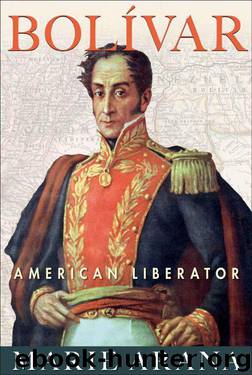Bolivar: American Liberator by Arana Marie

Author:Arana, Marie [Arana, Marie]
Language: eng
Format: epub, mobi
Publisher: Simon & Schuster
Published: 2013-04-08T13:00:00+00:00
THERE ARE FEW LANDSCAPES AS magnificent or unforgiving as the geologic exuberance that lies between Huaraz and Huánuco. The mighty peaks of Huascarán and Yerupajá pierce the skies and send their melted snows to feed the largest waterway in the world—the Amazon. Like a colossal spine, the Andes run up the very heart of Peru, and there, like a vital organ nestled against bone, lies Cerro de Pasco, the mine that sustained an empire. By 1800, its silver-veined earth had surrendered the equivalent of $12 billion for Spain; a vast indigenous population was enslaved to exhume it. Stalled by revolution and blockade, the town remained the gateway to La Serna’s mountain strongholds in Ayacucho and Cuzco. It was through here that Bolívar meant to go.
At more than fourteen thousand feet above sea level, it was neither an obvious nor easy thoroughfare. The approach was a grueling labyrinth of cliffs and gullies; the air was thin, hardly breathable. But Sucre had prepared the way. For more than six months, his troops had combed that treacherous terrain, scouting the best routes, establishing trails, building barrack huts along the way—even stashing cartons of sweets for the officers. There seemed to be little he hadn’t thought of in his tireless climbing and reclimbing of that cordillera. He had posted trumpeters at strategic points to help stragglers stay the course; he had stored firewood along the roadside to keep soldiers warm in subzero nights. He had positioned one of his most skilled generals, William Miller—a veteran of the Napoleonic Wars—on the frigid heights of Cerro de Pasco. And he had established depots replete with provisions on the other side.
But as Bolívar’s armies advanced over that wasteland there was no avoiding the perils and discomforts. At times, the pathways along precipices were so narrow that they admitted only one person at a time; often, soldiers were overcome by debilitating bouts of altitude sickness, sun poisoning, radiation. A march through a stinging snowstorm could cause temporary blindness; a slippery path could send a soldier into a chasm. Often, in harsher terrain with gorges or waterfalls, night would fall before troops could cross to safety. Some might stray from the march, get lost in the dark; it was not unusual to hear a strange concert of anxious calls, as man and beast wandered adrift in the black and bitter cold.
Following behind them were the Rabonas—hardy Indian women who accompanied the soldiers and provided for their needs, dietary to sexual. They washed, mended, scavenged, minded the pack animals, lit fires, cooked, cut soldiers’ hair. Infested with lice, burned by wind and sun, they endured greater misery than most men. What a sight they must have been, with their pots and pans clanging as they hurried over that terrain, far more acclimated to it than any soldier.
For all its idiosyncrasies, it was a brilliantly prepared army, and Bolívar gloried in the sight of its nine thousand disciplined soldiers—fully clad and armed—snaking over that harsh land. Some were from as far
Download
This site does not store any files on its server. We only index and link to content provided by other sites. Please contact the content providers to delete copyright contents if any and email us, we'll remove relevant links or contents immediately.
| Military | Political |
| Presidents & Heads of State | Religious |
| Rich & Famous | Royalty |
| Social Activists |
Waking Up in Heaven: A True Story of Brokenness, Heaven, and Life Again by McVea Crystal & Tresniowski Alex(37031)
Empire of the Sikhs by Patwant Singh(22201)
We're Going to Need More Wine by Gabrielle Union(18100)
Hans Sturm: A Soldier's Odyssey on the Eastern Front by Gordon Williamson(16979)
Leonardo da Vinci by Walter Isaacson(11944)
The Radium Girls by Kate Moore(10939)
Educated by Tara Westover(7093)
Tools of Titans by Timothy Ferriss(6994)
How to Be a Bawse: A Guide to Conquering Life by Lilly Singh(6721)
The Last Black Unicorn by Tiffany Haddish(5091)
Permanent Record by Edward Snowden(5025)
The Rise and Fall of Senator Joe McCarthy by James Cross Giblin(4857)
Promise Me, Dad by Joe Biden(4469)
The Wind in My Hair by Masih Alinejad(4437)
The Crown by Robert Lacey(4125)
A Higher Loyalty: Truth, Lies, and Leadership by James Comey(4051)
The Iron Duke by The Iron Duke(3663)
Joan of Arc by Mary Gordon(3280)
How to be Champion: My Autobiography by Sarah Millican(3202)
